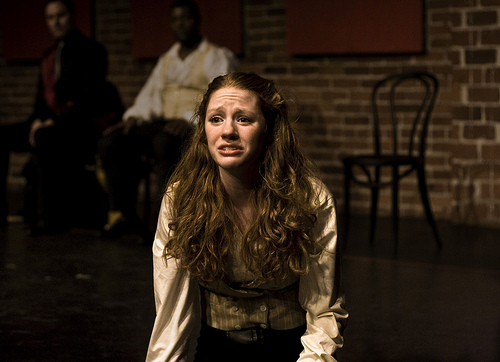
Source: soliloquy, Alice, Flickr
If you attend plays written in the last century, you will probably see actors delivering monologues either when they are alone onstage or when they are taking the floor to deliver a speech to other characters.
You will be less likely to see actors delivering soliloquies. Monologues, even when delivered in private, are public speeches. Sabina, the maid in The Skin of Our Teeth, talks to the audience. She introduces the audience to the play by making fun of the way many plays start. She gives the audience information they need but also sets the tone for the rather surrealistic performance. She is certainly not telling us the inner thoughts of her character.
In fact, Sabina is not so much a character as a caricature. She has many public thoughts (what she likes, what she doesn’t like), and these thoughts are what she shares with the audience in her monologue at the beginning of the play. She doesn’t tell us personal, secret information. She doesn’t tell us her fears about living in this crazy house or her dreams of getting a different job or her hopes for the future. She doesn’t expose insecurities, uncertainties, fantasies, or areas of guilt or shame. These private “diary entry” topics, however, are the stuff of soliloquies.
Let’s look at an extreme example of a soliloquy spoken by Macbeth’s wife in Shakespeare’s Macbeth, Act V, Scene 1.

Source: 11SSC_MacBeth 71, Seattle
Shakespeare Company, Flickr
LADY MACBETH
. . . Out, I say! One: two: why, then, ’tis time to do't. . . . Fie, my lord, fie! a soldier, and a feard? What need we fear who knows it, when none can call our power to account?—Yet who would have thought the old man to have had so much blood in him.
Do you understand what she’s saying? Don’t worry if you think it doesn’t make much sense. It makes sense only inside Lady Macbeth’s head (and, at this point, she is both sleepwalking and going crazy). This is clearly not a public statement. She is saying her thoughts in her head aloud as they shift, change, and interrupt each other. This is a classic example of a soliloquy.

Source: Romeo and Juliet, Timothy Faust, Flickr
Of course, sometimes the private thoughts going through our heads are not so crazy. In Act II, Scene 2 of Romeo and Juliet (below), Juliet wonders to herself why in the world Romeo has to be named “Romeo Montague.” Why couldn’t he have a different name? She wishes he had a different name because then he wouldn’t be part of the family who is her family’s enemy.

Source: Romeo and Juliet, Timothy Faust, Flickr
JULIET
'Tis but thy name that is my enemy;
Thou art thyself, though not a Montague.
What's Montague? it is nor hand, nor foot,
Nor arm, nor face, nor any other part
Belonging to a man. O, be some other name!
What's in a name? That which we call a rose
By any other name would smell as sweet;
So Romeo would, were he not Romeo call’d
Retain that dear perfection which he owes
Without that title. Romeo, doff thy name;
And for that name, which is no part of thee,
Take all myself.


Source: Day 13: Lantern Soliloquy (9.18.10), Jessica Wimer, Flickr
There are soliloquies in modern plays, but not very many. However, one convention in the modern theater is very similar to a soliloquy. Do you have any idea what it might be? (Hint: It’s a part of musical theater.)
When a character sings a song that expresses private thoughts, the song functions much like a soliloquy.
Watch a minute or two of this scene from West Side Story, which is based on Romeo and Juliet. Tony (Romeo) has just met Maria (Juliet). Watch this video to see how Tony responds.
You might think of this song as a monologue, but it has more qualities in common with a soliloquy. Can you pick out these qualities? Drag and drop the soliloquy-like qualities into the “Qualities of a Soliloquy” box below.
